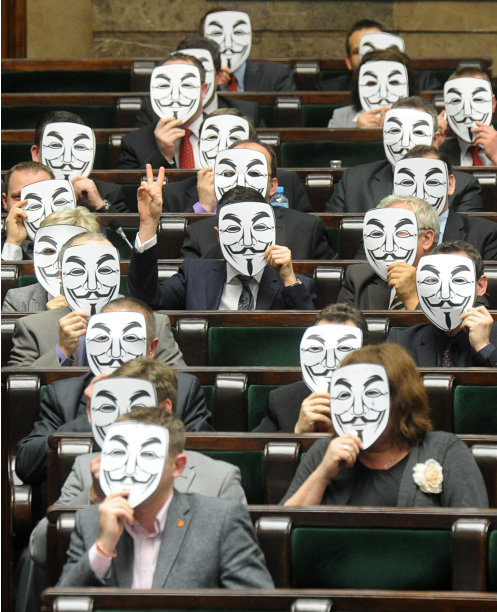The European Union has officially signed the controversial “anti-piracy” trade agreement ACTA.
It hereby follows in the footsteps of Australia, Canada, Japan, South Korea, Morocco, New Zealand, Singapore and the United States, who already signed it last October.
The EU and 22 of its member nations signed the Anti-Counterfeiting Trade Agreement (ACTA) today, January 27, 2012. Despite its name, ACTA covers copyright violations and digital piracy as well as knock-off handbags and other counterfeit goods. It's been accused of being undemocratic because negotiations were originally conducted in secret — although a full text of the treaty is available now online. Anonymous and others even compare it to SOPA, claiming that vague language could allow ISPs to be held criminally liable for aiding in mass copyright infringement.
The treaty was first signed in Tokyo on October 1, 2011 by the United States, Australia, Canada, Japan, South Korea, Singapore, New Zealand, and Morocco, and has created some protest among internet rights groups and even public officials. A French member of the European Parliament who was assigned with examining ACTA quit that responsibility today, citing unprecedented maneuvers by Parliament to accelerate passage of the agreement before the public became aware of it. On the other hand, European Commission spokesperson Ryan Heath has been tweeting "the facts" about ACTA in an effort to clear up misconceptions among the public. We'll take a closer look at the text to see what the treaty actually does soon. The European Parliament will vote to ratify the treaty in June after a number of committees give their opinions on the agreement.

Lawmakers from the leftist Palikot's Movement cover their faces with masks as they protest against ACTA, or the Anti-Counterfeiting Trade Agreement, during a parliament session, in Warsaw, Poland, ...
It hereby follows in the footsteps of Australia, Canada, Japan, South Korea, Morocco, New Zealand, Singapore and the United States, who already signed it last October.
The EU and 22 of its member nations signed the Anti-Counterfeiting Trade Agreement (ACTA) today, January 27, 2012. Despite its name, ACTA covers copyright violations and digital piracy as well as knock-off handbags and other counterfeit goods. It's been accused of being undemocratic because negotiations were originally conducted in secret — although a full text of the treaty is available now online. Anonymous and others even compare it to SOPA, claiming that vague language could allow ISPs to be held criminally liable for aiding in mass copyright infringement.
The treaty was first signed in Tokyo on October 1, 2011 by the United States, Australia, Canada, Japan, South Korea, Singapore, New Zealand, and Morocco, and has created some protest among internet rights groups and even public officials. A French member of the European Parliament who was assigned with examining ACTA quit that responsibility today, citing unprecedented maneuvers by Parliament to accelerate passage of the agreement before the public became aware of it. On the other hand, European Commission spokesperson Ryan Heath has been tweeting "the facts" about ACTA in an effort to clear up misconceptions among the public. We'll take a closer look at the text to see what the treaty actually does soon. The European Parliament will vote to ratify the treaty in June after a number of committees give their opinions on the agreement.

Lawmakers from the leftist Palikot's Movement cover their faces with masks as they protest against ACTA, or the Anti-Counterfeiting Trade Agreement, during a parliament session, in Warsaw, Poland, ...


Comment